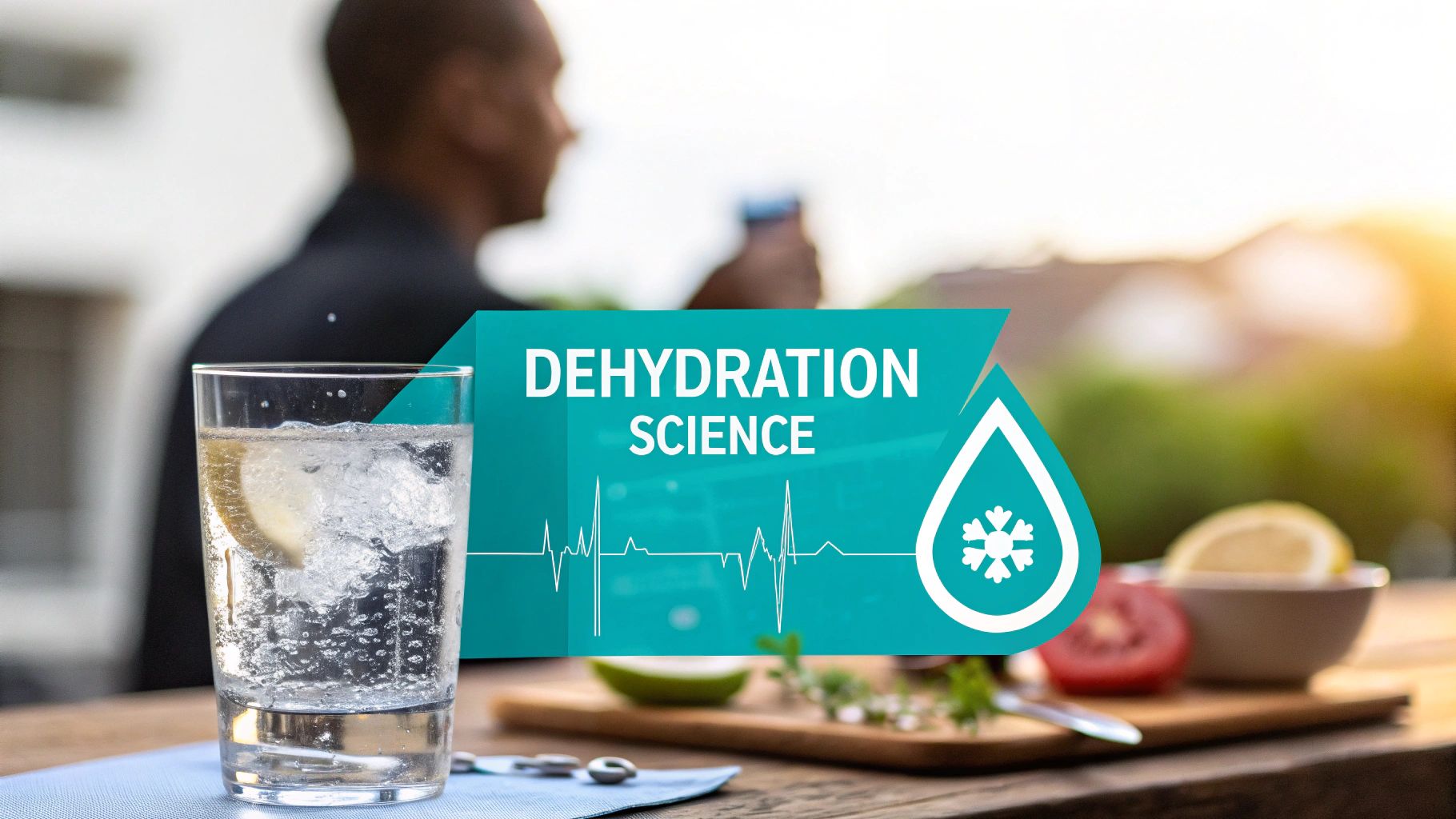

· By Annemarie
How Does Alcohol Dehydrate You? Surprising Science Explained
Your Body's Hidden Water Management System
Imagine your body is a sophisticated smart home, constantly working behind the scenes to keep its internal water levels perfectly balanced. This process, known as homeostasis, relies on a seamless communication network between your brain, hormones, and kidneys. The star player in this system is a chemical messenger called antidiuretic hormone (ADH), also known as vasopressin. When your body senses that you're running low on water, your brain releases ADH.
Think of ADH as a manager sending an urgent memo to your kidneys. The message is simple: "Hold onto water!" In response, your kidneys reabsorb more water back into your system instead of sending it out as urine. It's a brilliant, self-regulating process that keeps you properly hydrated. But this finely tuned system can be easily thrown off course, and that's exactly what alcohol does.
To understand how this disruption happens, let's compare the body's normal hydration process with what happens when alcohol enters the picture.
Normal vs. Alcohol-Affected Hydration Process
A comparison showing how your body's hydration system works normally versus when disrupted by alcohol
| Body System | Normal Function | With Alcohol Present | Impact Level |
|---|---|---|---|
| Brain (Hypothalamus) | Detects dehydration and releases ADH to signal water conservation. | Alcohol suppresses ADH release, tricking the brain into thinking the body is well-hydrated. | High |
| ADH Levels | Rise when the body is dehydrated, promoting water reabsorption. | Plummet, removing the "stop" signal for urination. | High |
| Kidneys | Respond to ADH by reabsorbing water and producing concentrated urine. | Without ADH signals, they flush out large amounts of water, leading to excessive urination and dilute urine. | High |
| Overall Hydration | Remains balanced (homeostasis) through this feedback loop. | The body loses more fluid than it takes in, leading to dehydration. | High |
As the table shows, alcohol doesn't just add liquid to your system; it actively sabotages the communication lines. It essentially gags ADH, preventing it from delivering its crucial message to the kidneys.
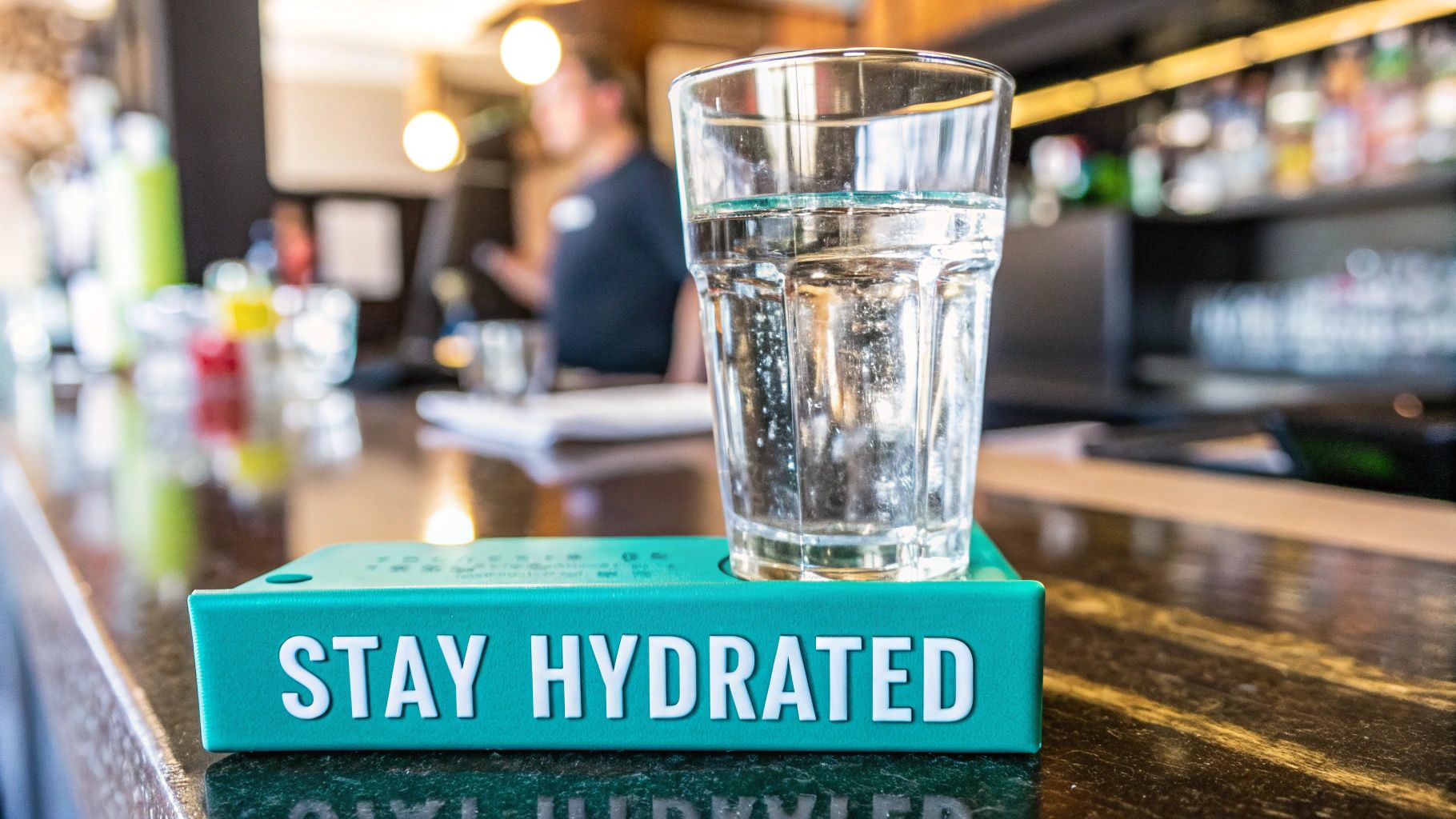
The intricate shape of the ADH molecule you see above is key to how it interacts with your kidneys. When alcohol interferes, it blocks this vital biological communication. Grasping this core process is the first step to answering the question: how does alcohol dehydrate you? It's not just about the volume you drink; it’s about alcohol forcing your body's water management system into overdrive, causing your kidneys to expel far more water than they should.
The Hormone Hijack That Changes Everything
While you're enjoying a drink, your brain is getting caught in a clever biochemical trap. The target? A critical hormone called vasopressin, which you might also know as antidiuretic hormone (ADH). Think of vasopressin as your body's "water-retention manager." It’s constantly sending messages from your brain to your kidneys, telling them exactly how much water to save to keep your body perfectly hydrated.
This hormonal communication is the secret to understanding how alcohol dehydrates you so well. Alcohol messes with this system by directly suppressing the release of vasopressin. When those signals from the brain are blocked, your kidneys never get the memo to hold onto water. Instead, they open the floodgates and send water straight to your bladder. This is why just one drink can have you making a beeline for the restroom.
The ADH Suppression Cascade
The process is a swift, three-step hormonal disruption that quickly leads to fluid loss.
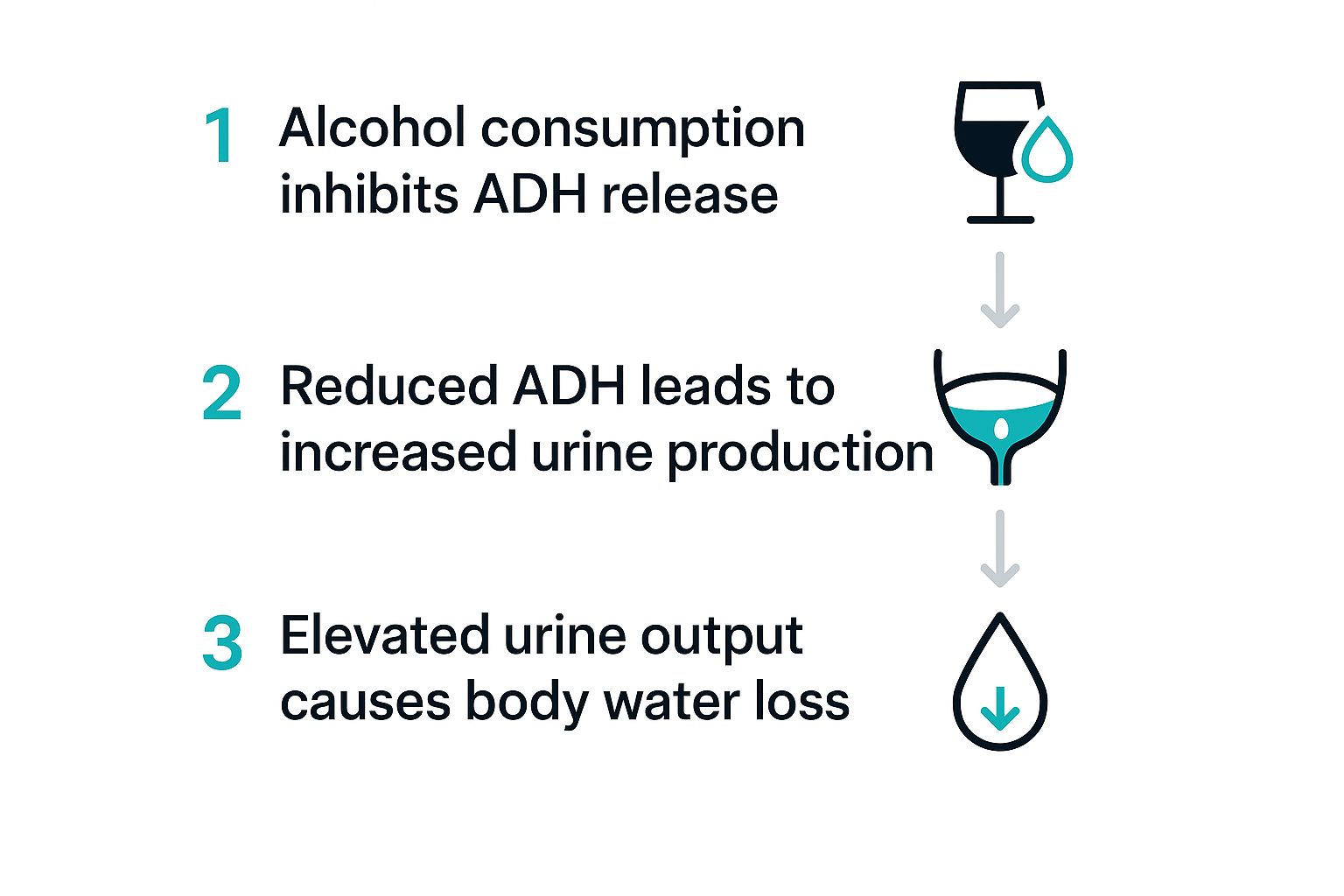
This infographic shows the chain reaction: drinking alcohol blocks ADH, which then signals the kidneys to get rid of extra water, ultimately causing dehydration.
The Role of Vasopressin in Your Body
Vasopressin is a hormone made in the hypothalamus, a small but mighty part of your brain. Its main job is to manage your body’s water levels by controlling how your kidneys work.
This interference is surprisingly powerful. For every 200 ml of beer you drink (about two-thirds of a can), your body might get rid of as much as 320 ml of water. That’s a net fluid loss from just one drink.
The effect doesn't stop when you put your glass down. It continues long after you stop drinking as your body works to get its hormones back in check. This is why chugging water the next morning doesn't always make you feel better right away—your system is still trying to recover from the hormonal disruption.
Why Your Drink Choice Determines Your Fate
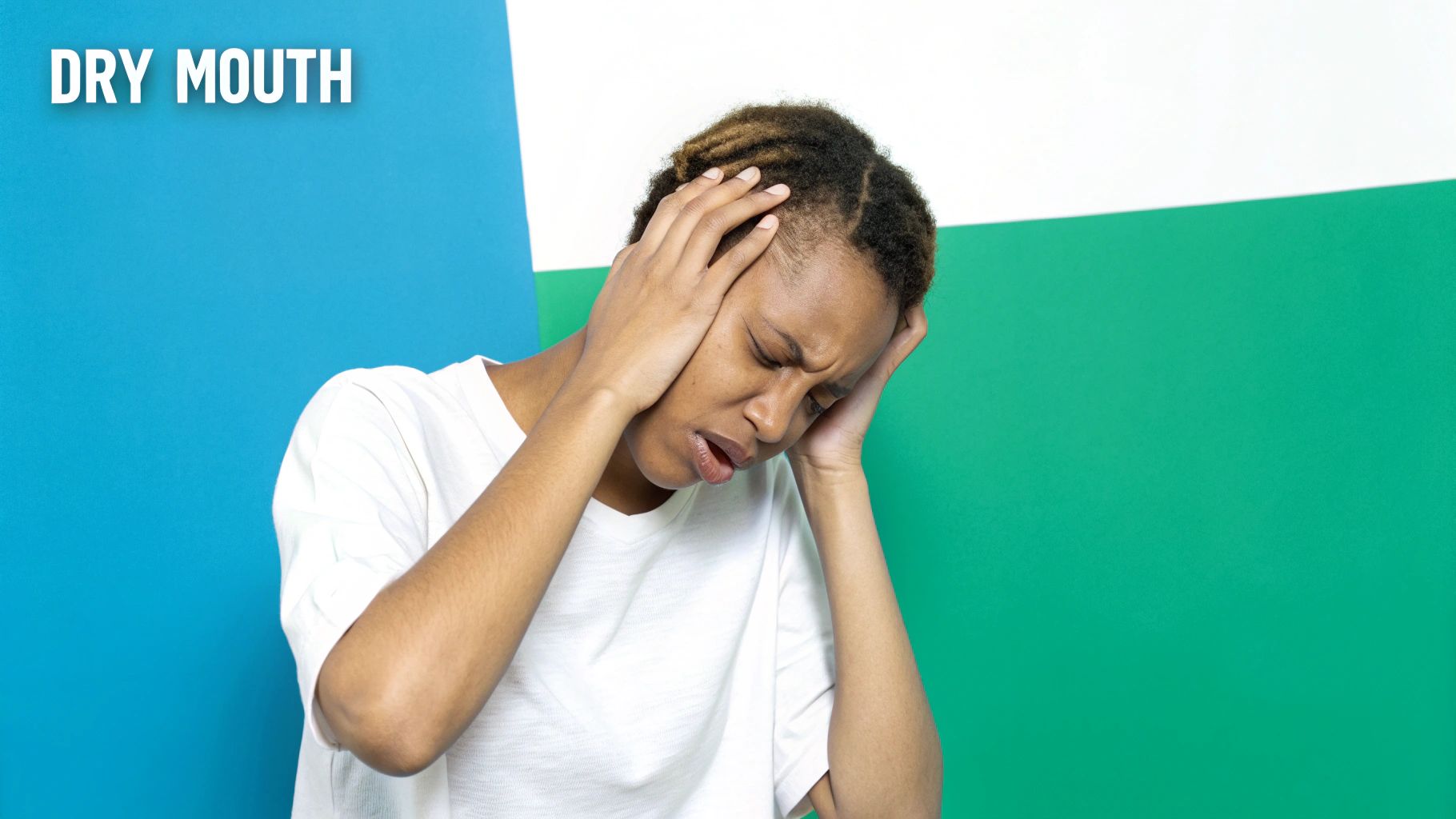 When you're trying to figure out how alcohol dehydrates you, it's crucial to understand that not all drinks are created equal. The concentration of alcohol in your glass plays a massive role in how much water your body ultimately loses. It's a common belief that all alcoholic beverages are just as dehydrating, but the reality is much more complex.
When you're trying to figure out how alcohol dehydrates you, it's crucial to understand that not all drinks are created equal. The concentration of alcohol in your glass plays a massive role in how much water your body ultimately loses. It's a common belief that all alcoholic beverages are just as dehydrating, but the reality is much more complex.
Alcohol by Volume: The Deciding Factor
Think of it this way: your body can process small amounts of alcohol without triggering a major diuretic effect. Research shows that drinks with very low alcohol content (around 2% or less) have a nearly unnoticeable impact on your hydration levels, especially if you're drinking a lot of fluid.
However, once the alcohol content hits 4%—the level in many standard beers—the diuretic effect kicks in more seriously. At this point, alcohol starts to slow down your body's ability to rehydrate. This means that even a regular beer can begin to tip your internal scales toward dehydration. You can dive deeper into the science behind how alcohol concentration impacts fluid recovery.
To better visualize how different drinks stack up, this table compares popular beverage types and their relative risk of causing dehydration.
Alcohol Content vs. Dehydration Risk
Comparison of different alcoholic beverages and their relative dehydration potential
| Beverage Type | Alcohol % | Dehydration Risk | Hydration Strategy |
|---|---|---|---|
| Light Beer | 2-4% | Low | Often consumed in large volumes, which can partially offset fluid loss. |
| Standard Beer | 4-6% | Moderate | The diuretic effect becomes noticeable. Alternate with water. |
| Wine | 12-15% | High | Higher alcohol concentration significantly increases urine output. |
| Spirits (neat) | 40%+ | Very High | Extremely concentrated; rapidly suppresses ADH, causing fast fluid loss. |
| Cocktails | 15-30% | Variable | Depends on mixers; sugary mixers can worsen dehydration. |
This table shows a clear pattern: the stronger the drink, the faster you'll become dehydrated. While a couple of light beers might not cause major issues, cocktails and straight spirits are a different story.
The Pre-Hydration Predicament
Your starting hydration level is just as important as what you’re drinking. Having a few drinks on a hot day or right after a sweaty workout is a recipe for trouble because you're already in a state of "fluid debt."
When your body is low on water, introducing alcohol is like adding fuel to a fire. Your kidneys are already trying to hold onto every last drop of water, but the hormonal interference from alcohol forces them to do the exact opposite. This accelerates fluid loss at the worst possible time.
This kicks off a dangerous cycle where your initial dehydration makes alcohol’s effects even worse, leading to a much more severe state of dehydration than you’d experience otherwise. Grabbing a high-proof spirit or a strong cocktail in this state is particularly risky, as the potent alcohol concentration puts this damaging process into overdrive.
The Hidden Electrolyte Disaster
Losing water is only one part of the story when you're figuring out how alcohol dehydrates you. The real trouble brews when alcohol disrupts your body’s delicate electrolyte balance. Think of electrolytes—like sodium, potassium, and magnesium—as your body’s internal power grid. They are the electrical conductors managing everything from nerve signals and muscle contractions to the fluid levels inside your cells.
When alcohol’s diuretic effect kicks into high gear, you don't just lose water; you flush out these critical minerals right along with it. This creates a hidden electrolyte disaster. It’s the reason you can chug water all morning and still feel terrible—you're replacing the liquid but not the essential minerals your body needs to actually function. This imbalance is a primary culprit behind classic hangover symptoms like headaches, fatigue, and muscle weakness.
The Role of Key Electrolytes
Losing specific electrolytes leads to particular hangover miseries. Here’s a quick breakdown:
- Sodium: This mineral is crucial for keeping your body’s fluids balanced. When it gets low, you can feel fatigued and even confused.
- Potassium: Essential for proper muscle and nerve function. A lack of it is why you might feel weak or experience muscle cramps.
- Magnesium: This powerhouse is involved in over 300 biochemical reactions in your body. When it's depleted, headaches and fatigue can feel much worse.
The chart below shows some common signs of an electrolyte imbalance.
As the image highlights, symptoms like fatigue, headaches, and muscle spasms are directly tied to electrolyte disturbances—all familiar complaints after a night of drinking. To learn more about which minerals can help you bounce back, check out our guide on the top electrolytes for a hangover. Remember, restoring these minerals is just as important as rehydrating with water.
When Dehydration Amplifies Alcohol's Mental Impact
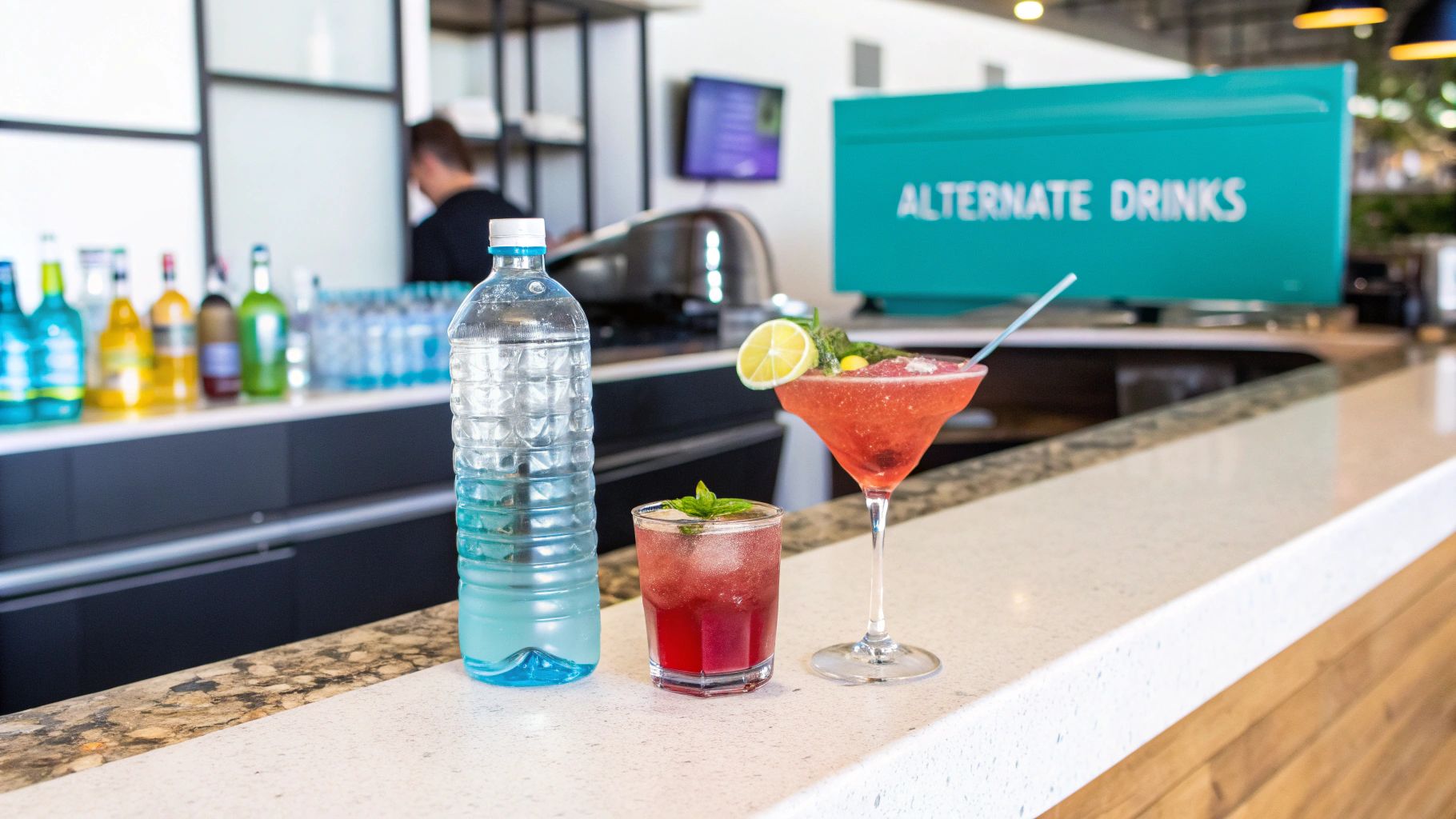 We often focus on the physical side of a hangover—the headache, the thirst, the fatigue. But we tend to ignore what alcohol-induced dehydration does to our brains. When you mix fluid loss with alcohol, you create a perfect storm for mental fog that goes far beyond what either would cause on its own. Your judgment, reaction time, and overall mental sharpness take a serious dive.
We often focus on the physical side of a hangover—the headache, the thirst, the fatigue. But we tend to ignore what alcohol-induced dehydration does to our brains. When you mix fluid loss with alcohol, you create a perfect storm for mental fog that goes far beyond what either would cause on its own. Your judgment, reaction time, and overall mental sharpness take a serious dive.
This isn't just a feeling; it's a measurable drop in performance. Imagine having a few drinks after an intense workout or on a hot summer day. You're already running on a low fluid tank. In this state, alcohol doesn't just fail to quench your thirst—it actively sabotages your brain's ability to function clearly.
The Cognitive Double Whammy
Think of your brain cells like tiny sponges. When you're dehydrated, they shrink, slowing down the vital electrical signals that allow them to communicate. Now, add alcohol to the mix, and you've got a "cognitive double whammy" that hits your most important mental functions.
- Executive Function: This is your brain's CEO, in charge of planning and making smart decisions. Dehydration and alcohol together make it much harder to think through the consequences of your actions.
- Reaction Time: Your ability to respond quickly—whether in a fast-paced conversation or behind the wheel—slows down significantly.
- Response Inhibition: This is your brain's "stop" button that prevents you from making a bad choice. It's a key reason why decisions made while drinking and dehydrated are so often filled with regret.
Controlled studies back this up. Research has shown that when people were dehydrated by just 2.5% of their body weight, adding alcohol to the mix impaired their brain function far more severely than when they were properly hydrated. You can find out more about these cognitive findings and see just how seriously alcohol affects a dehydrated brain. Ultimately, understanding what causes hangovers means recognizing this critical link between your hydration levels and your mental state.
Smart Hydration Strategies That Actually Work
Knowing the science behind why alcohol dehydrates you is one thing, but actually putting that knowledge to use is a whole different ballgame. To truly lessen the impact of dehydration, you need to go beyond simply chugging more water and start using smarter, proven tactics. The key is to build lasting habits that you can stick with in real-world scenarios, from work dinners to weekend get-togethers.
A good hydration plan isn't just about how much you drink—it’s about when and what you drink. The best approach involves being proactive with your hydration before, during, and after you have a few drinks.
The Three Pillars of Smart Hydration
Think of your hydration strategy as a three-stage plan designed to give your body the support it needs through every phase of alcohol consumption.
-
Before You Drink: The Pre-Load Starting out with a full tank of fluids is a must. If you begin drinking when you're already a bit dehydrated, you’re just setting yourself up for a rougher time later. Make a point to drink plenty of water throughout the day. For an extra boost, try a hydration supplement with key electrolytes like sodium and potassium. This ensures your body’s mineral stores are topped off before alcohol's diuretic effects kick in.
-
While You Drink: Pace and Alternate The old advice to alternate alcoholic drinks with water is solid for a good reason: it slows down your drinking pace and helps offset fluid loss as it happens. A great rule of thumb is the one-to-one ratio. For every beer, glass of wine, or cocktail you have, follow it up with a full glass of water. This simple trick can make a huge difference in keeping your body's fluid levels in check.
-
After You Drink: The Recovery Phase This is when smart rehydration becomes absolutely essential. Plain water often isn't enough at this stage because your body has lost crucial electrolytes along with fluids. To properly get back in balance, you need something that replenishes both. This is where products like Upside Hangover Sticks are especially useful, as they're formulated to restore the very electrolytes you lose while drinking. For more helpful tips, check out our guide on the best way to rehydrate after drinking.
Your Personal Hydration Action Plan
Now that we understand the science of how alcohol dehydrates you, let’s turn that knowledge into a game plan. Think of this as your go-to guide for staying hydrated while drinking, breaking down complex science into simple, real-world steps. Whether you’re planning for a big celebration or just a spontaneous night out, this plan has you covered.
Tailor Your Strategy to the Situation
Not all drinking occasions are created equal, so your hydration plan shouldn't be a one-size-fits-all approach. Your strategy needs to change based on where you are and what you've been doing.
- Social Events & Dinners: Pacing is your best friend here. A great rule of thumb is the one-for-one rule: for every alcoholic drink, have a full glass of water. This simple trick slows down your drinking and helps replace lost fluids as you go.
- Post-Workout or Hot Weather: In these scenarios, you're already starting with a hydration deficit. It's essential to pre-hydrate with water and an electrolyte-rich drink before you even have your first alcoholic beverage. This helps you get back to a baseline after losing fluids through sweat.
- High-Proof Drinks (Spirits/Cocktails): These drinks can speed up dehydration quite a bit. If you're sipping on spirits or cocktails, it becomes even more crucial to increase your water intake between rounds. Consider adding an extra glass of water for every cocktail to stay ahead.
Recognizing the Early Warning Signs
Your body is pretty good at telling you when it needs water. Learning to spot these early signals allows you to take action before dehydration really takes hold. Look out for increased thirst, a dry mouth, darker-than-normal urine, and the first hints of fatigue or a headache. These are your body’s cues to hit pause on the alcohol and focus on rehydrating with water and electrolytes.
By combining the scientific ‘why’ with these practical ‘how-to’ steps, you can make smarter choices that reduce the impact of dehydration. For a foolproof way to support your body's recovery, add Upside Hangover Sticks to your post-drinking routine. They are specially formulated to replenish lost fluids and electrolytes, helping you feel better, faster. Give your body the support it needs with Upside.
